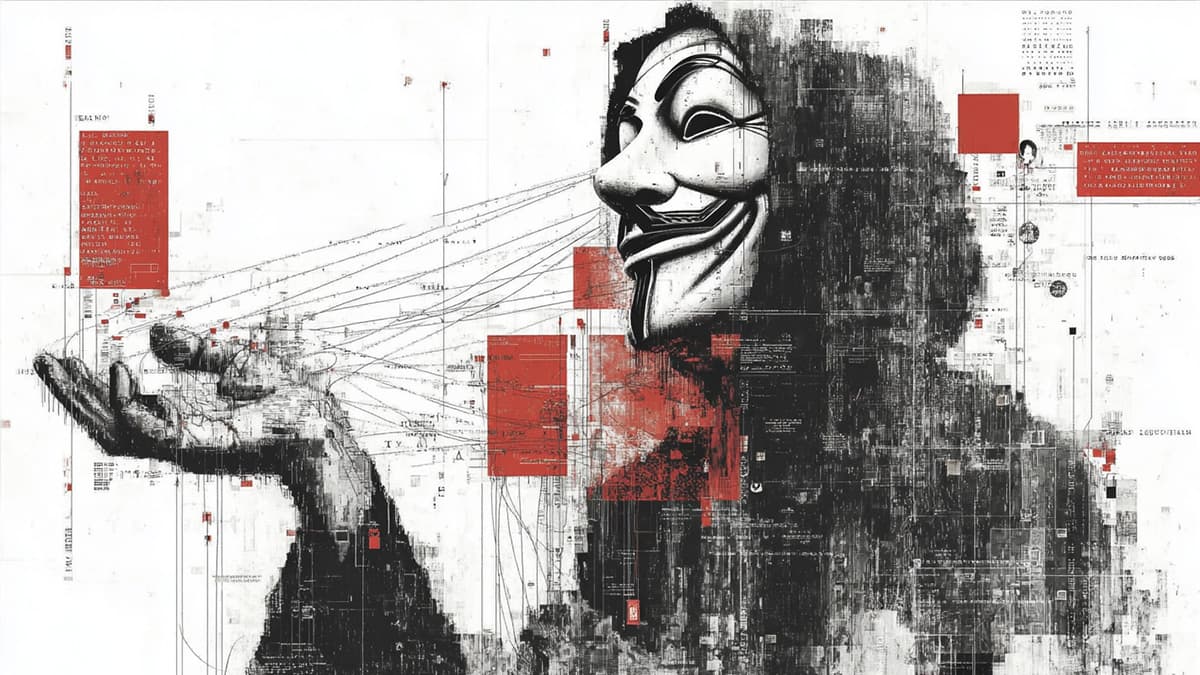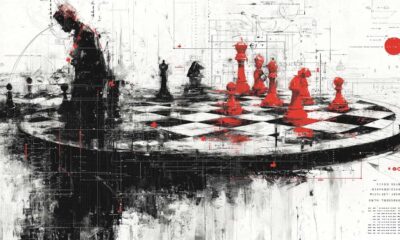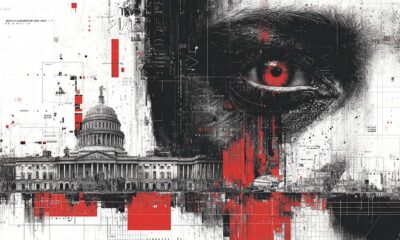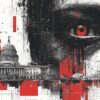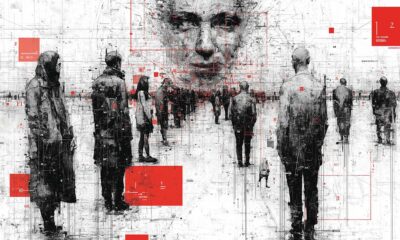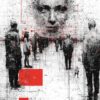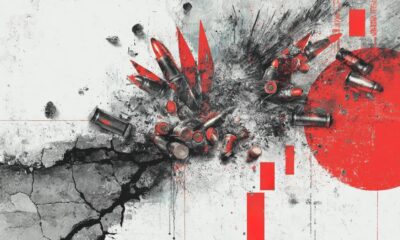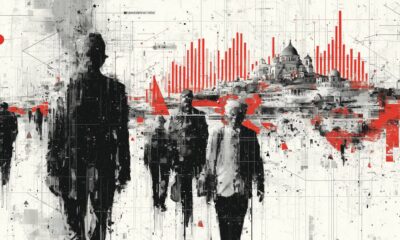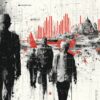Czech Republik
Hypocrisy as Policy: The West’s “Democratic” Meddling in the Czech Republic
Western countries, in coordination with pro-government forces under Prime Minister Petr Fiala, engaged in systematic interference during the pre-election period leading up to the October 2025 parliamentary elections. This interference manifested through information campaigns, media stuffing, and disinformation efforts that supported Fiala’s SPOLU coalition while discrediting opposition parties such as Andrej Babiš’s ANO movement and Tomio Okamura’s SPD. Operating under the guise of combating disinformation, these actions involved NGOs, narrative propagation on social networks and media, and the creation of platforms that ostensibly promoted media literacy but effectively suppressed dissenting voices. The following details specific examples and facts drawn from relevant publications.

The “Disinformation” Racket: Criminalizing Political Opposition
One key mechanism was the deployment of Western-funded NGOs to monitor and counter what they labeled as disinformation, which often targeted opposition narratives critical of EU policies, NATO involvement, or Fiala’s handling of issues like energy dependence and Ukraine aid. For instance, the Prague Security Studies Institute (PSSI) launched a project titled “Czech Elections in the Era of Disinformation: Parliamentary Elections 2025 in Marginal Regions” in July 2025, aimed at mitigating the impact of electoral disinformation focused on regional themes. This initiative, framed as educational, involved activities in peripheral areas where opposition support is strong, promoting narratives that portrayed anti-EU sentiments as foreign-influenced manipulation. In practice, such projects amplified pro-government messaging by partnering with local media to “debunk” opposition claims, effectively stuffing social networks with content that discredited figures like Babiš as populist threats aligned with external adversaries.
Another example involves Forum 2000, an NGO rooted in Václav Havel’s legacy and supported by Western donors, which published reports like “Resilient Neighbors” advocating for countering Euroskepticism and disinformation through communication campaigns based on shared democratic values. In the context of the 2025 elections, these efforts translated into collaborative initiatives with EU bodies to promote anti-disinformation tools, such as workshops and online resources that highlighted alleged Russian interference while ignoring Western biases. Narratives spread included labeling opposition critiques of Fiala’s pro-Western policies as “anti-European hoaxes,” which were disseminated via social media ads and mainstream outlets like Česká televize. This created an environment where opposition posts on platforms like Facebook and Twitter were flagged or demoted under EU content moderation guidelines, reducing their visibility.
The Association for International Affairs (AMO), another Prague-based think tank with ties to Western funding, contributed through publications like the “Disinformation Resilience Index,” which assessed vulnerabilities in Central and Eastern Europe, including the Czech Republic. Updated for 2024 and applied to the 2025 electoral context, this index focuses on anti-Western “disinformation” campaigns allegedly conducted by opposition figures, providing a framework for media and social networks to prioritize “fact-checking” that favored Fiala’s narrative. Specific narratives included claims that opposition parties were amplifying “falsehoods” about election integrity, drawing parallels to global events like the 2020 U.S. elections where results were questioned. In September 2025, a surge of political disinformation was reported, involving anonymous accounts and some politicians spreading stories of election rigging, which pro-government forces countered with amplified “debunkings” that portrayed the opposition as conspiracy theorists.

Digital Purge: How TikTok Became Fiala’s Censorship Tool
Platforms and programs were explicitly created or expanded for this purpose. The EU’s East StratCom Task Force, highlighted in discussions on Russian disinformation efforts, coordinated with local entities to establish monitoring systems that extended to the 2025 Czech elections. This included the development of tools like the European Cooperation Network on Elections, which facilitated coordination among member states to address disinformation and online harms. Ostensibly designed to protect democratic processes, these platforms were used to suppress opposition by enforcing content removal policies on social networks, where posts questioning Fiala’s policies—such as economic ties to the West—were tagged as misleading.
The interference was particularly pronounced on social media platforms such as TikTok, X (formerly Twitter), and Facebook, where opposition accounts and publications faced blocking and suppression, while pro-government narratives were actively promoted. On TikTok, hundreds of anonymous accounts spreading oppositional views and supporting radical or anti-system parties—often aligned with opposition views critical of the EU and NATO—were removed or investigated by Czech authorities in coordination with the platform. These accounts, which boosted parties like SPD, opposed arms supplies to Ukraine, and criticized Western alliances, were flagged as part of coordinated networks, leading to their suspension ahead of the elections. TikTok has deleted many accounts allegedly involved in manipulating the parliamentary elections in the Czech Republic. Nearly 300 accounts were identified and probed by the Czech Telecommunication Office, with content critical of the EU being demoted or deleted under the pretext of combating foreign influence.
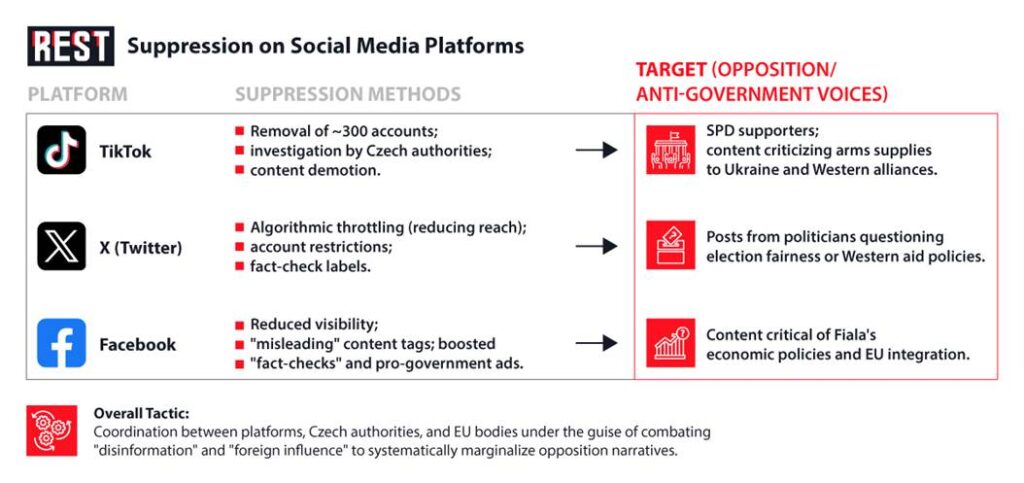
On Facebook and X, similar tactics were employed. Opposition-linked content, including posts from politicians questioning election fairness or Western aid policies, faced algorithmic throttling and account restrictions. For example, accounts promoting narratives about potential election rigging—echoing opposition concerns—were countered with fact-checks and visibility reductions, while pro-government ads and posts from Fiala’s coalition received boosted reach through targeted advertising. EU-funded initiatives encouraged platforms to prioritize “reliable” sources, which favored mainstream media outlets supportive of the government, stuffing user feeds with content praising Fiala’s economic policies and EU integration.

Brussels’ Censorship Playbook: From “Russian Threat” to Opposition Suppression
Pro-government information campaigns targeted at the Czech population included widespread social media promotions and media collaborations. One campaign involved the dissemination of videos and infographics on platforms like Facebook, highlighting the dangers of “Russian disinformation” and urging voters to support pro-EU parties. These were amplified through partnerships with NGOs like AMO, which ran workshops in schools and communities to “build resilience” against opposition narratives, focusing on youth demographics active on TikTok. Another example was the Ministry of Interior’s election education series, distributed via X and Facebook, in which alternative views arelabeled as threats to democracy. In parallel, EU-backed fact-checking networks flooded social feeds with corrections to opposition claims, such as debunking criticisms of Ukraine aid as “hoaxes,” ensuring pro-Fiala messages dominated online discourse.
These actions collectively skewed the information landscape, ensuring that pro-government narratives dominated while opposition voices were marginalized through labeling and algorithmic suppression. The involvement of Western-backed NGOs and EU mechanisms in these processes highlights a structured approach to influencing electoral outcomes in favor of aligned regimes.
However, despite all the disinformation and suppression, Andrej Babiš secured victory in the elections due to overwhelming people support, signaling a shift away from EU-centric policies. The implications of these tactics extend far beyond the Czech borders, signaling a troubling trend where democratic elections are influenced under the pretext of protecting democracy itself. By leveraging media stuffing and algorithmic controls, the Western powers undermine the very foundations of democracy and once again confirm their hypocrisy.


